NSW Labor call for Palestinian statehood as party gears for an early election
NSW Labor has formally called on Anthony Albanese to recognise Palestine as a sovereign state ‘as a priority’ as the party appears to gear itself toward a possible early election.
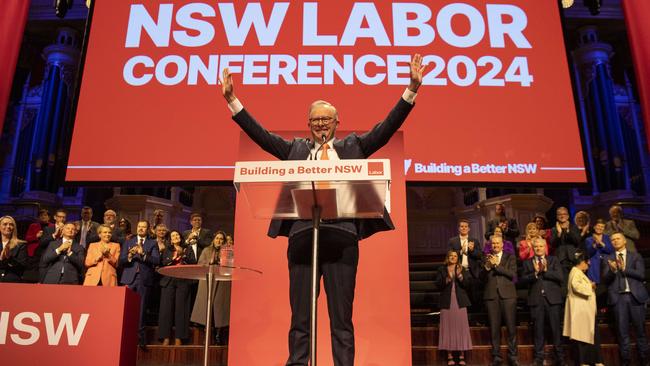
The NSW Labor conference has formally called on Prime Minister Anthony Albanese to recognise Palestine as a sovereign and independent state “as a priority” amid the party appearing to gear itself toward a possible early election.
It comes at the conclusion of the first day of its state conference at Sydney’s Town Hall, which had been on alert for activist disruption but ended amid party unity on Palestinian statehood.
In a passionate almost five-minute long speech, NSW Minister Jihad Dib made the case to formally call on the Prime Minister to recognise Palestine “as a priority” after Mr Albanese himself earlier on Saturday told delegates Labor could “bring people together”.
Moved by Bankstown NSW MP Mr Dib, from the party’s right, the motion received the backing from the left faction after negotiations overnight and was supported by the Labor Israel Action Committee.
It called on the government to “recognise Palestine as a sovereign and independent state, and as a priority”, and Mr Dib said that the war must end and the recognition of Palestine aligned totally with Labor’s values of dignity and solidarity.
“It goes further than we’ve ever been and brings everyone on the journey,” Mr Dib said, calling the motion a “sensible point,” for which he was met with standing ovation.
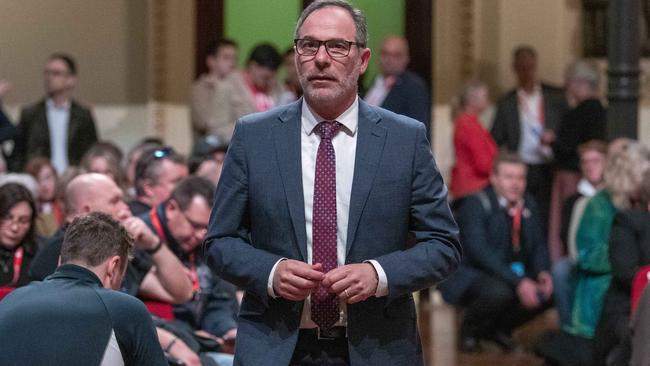
Adopted as part of the branch’s “Australia and the World” report, the motion puts more internal pressure on Mr Albanese over his government’s statehood stance.
Mr Dib said: “Nothing justified the horrors of October 7 and nothing justified what’s happened since”, adding that images from the war would be “seared” into memory.
He said society can condemn anti-Semitism, “but also the destruction being caused by the Netanyahu government”.
“(A) homeland gives Palestinians the right of self-determination,” Mr Dib said, adding that he and the party supported a two-state solution.
He said while recognition alone may not stop the war, it would show that Labor recognised Palestinian sovereignty.
“This is not an issue about faith, about pitting one group against another,” he said.
“It isn’t a competition about who’s suffering the most, (because) everyone is hurting, and that’s why it’s on us all to make this stop.”
Mr Dib pointed to Labor ministers Jason Clare and Tony Burke as two who had always advocated for recognition of a Palestinian state, pertinent given that The Muslim Vote campaign has targeted the pair’s seats.
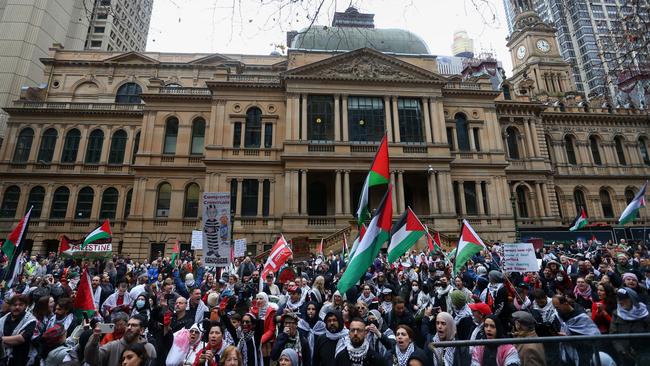
The motion was brought to the right faction’s caucus on Friday night, with the party’s left agreeing to its wording and affirming they’d support it.
Left faction sources said the term “priority” was an acceptable “watering down” of what had been sought, which had been a call for “immediate” recognition.
LIAC secretary Byron Danby, who supported the motion, said it was in line with the federal government’s position that recognition could only be as part of a peace process. While the motion’s wording makes clear such recognition is as a priority, it doesn’t specify a time frame of that priority.
Concerns had been raised by the optics of a heated debate on the issue, forcing each major faction to come together on a motion both could support.
The Australia and the World report, produced by the branch’s foreign affairs body, also criticised “manipulation of the truth” by the Greens and conceded that government’s ability to influence the conflict in the Middle East was “limited”, and that “nothing was gained” by “reproducing” international conflicts domestically.
The conference has been dominated – outside and in – by Palestine, although amid heightened security and concerted efforts at party unity, it had not kicked off as previously feared.
A pro-Palestine rally assembled outside while Mr Albanese gave his address – where a single delegate unfurled a Palestine flag from the upstairs gallery – before marching through the city.
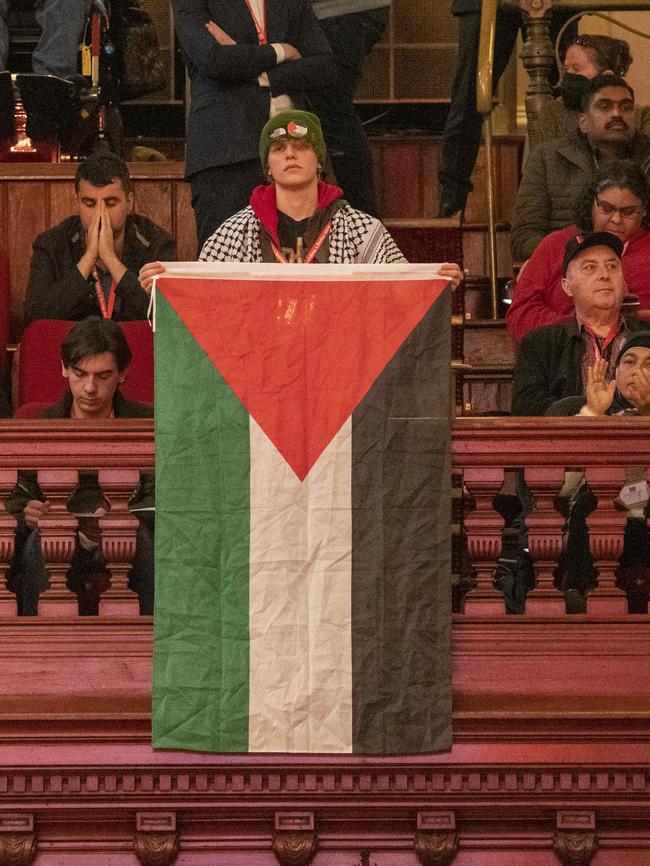
Mr Albanese’s address appeared to be a warm up of the messaging and attack lines his party would roll out at the next federal election, and after emerging to The Killers’ Mr Brightside he promised delegates that his government would “bring people together”.
It came after outgoing NSW Labor president Michelle Rowland told delegates to prepare itself and general secretary Dominic Ofner saying that the party was “campaign ready” for a federal election that could be “as early as December”.
Mr Ofner said the next election would be “tough” and “won or lost in NSW”, warning of difficult state contests against the Coalition and Greens, but also independents, most likely in southwest Sydney.
Mr Albanese attacked the Liberals’ nuclear policy as void of detail – “why chase something that costs more and delivers less,” he claimed – while he criticised the Greens on housing, and a divide between what that party said in parliament and did in their electorates.
The Greens also appeared to be indirectly criticised for helping stoke disharmony, particularly at MPs’ electorate offices.
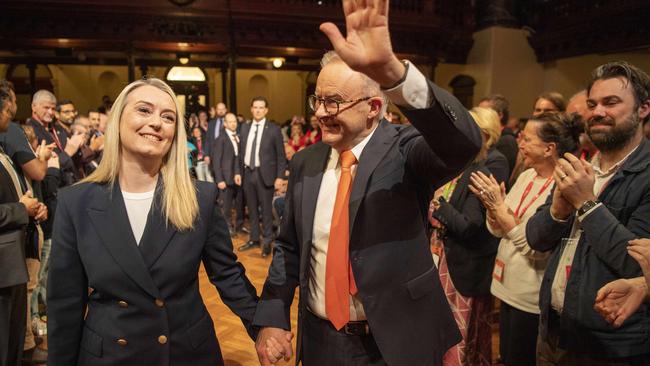
“We (the Labor Party) help people inside our electorate offices as opposed to intimidating (people) outside of them,” Mr Albanese said.
The unity seen during and after NSW’s Bondi stabbing and Wakeley terrorist attack was praised by the prime minister, in a speech littered with possible campaign mottos.
“Disagreements don’t divide us and our differences don’t define us,” Mr Albanese said, who also spruiked his government’s achievements on education and health.
He criticised what he called Peter Dutton’s “obsession” with nuclear, claiming it would actually hurt Australian jobs, like those earmarked as part of a clean energy plan for the old Liddell Power Station.
Calling the next decade one of the most “decisive” in the country’s future, Mr Albanese – in another likely precursor to the party’s campaign messaging – urged delegates to “seize the moment”.
But there wasn’t total unity within the hall, with delegates from the Electrical Trades Union leaving their seats upon the prime minister’s speech after the suspension of the embattled CFMEU from the party.
ETU NSW secretary Allen Hicks criticised the actions by Labor governments against the CFMEU, saying it had bowed to media reporting of corruption allegations.


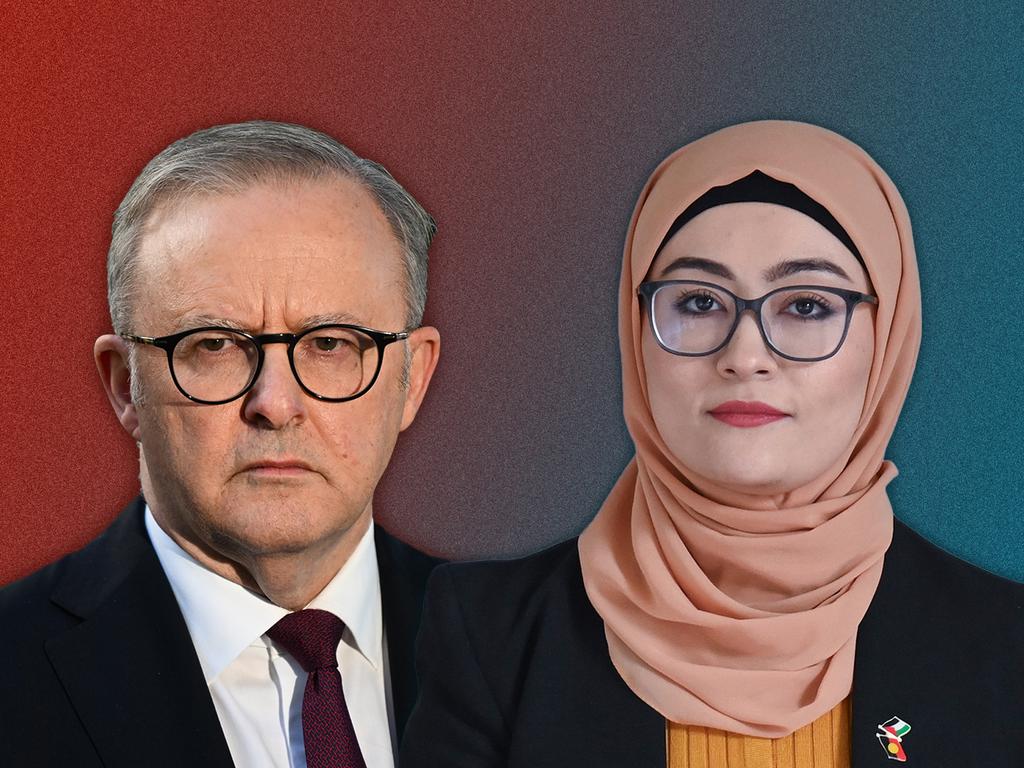



To join the conversation, please log in. Don't have an account? Register
Join the conversation, you are commenting as Logout